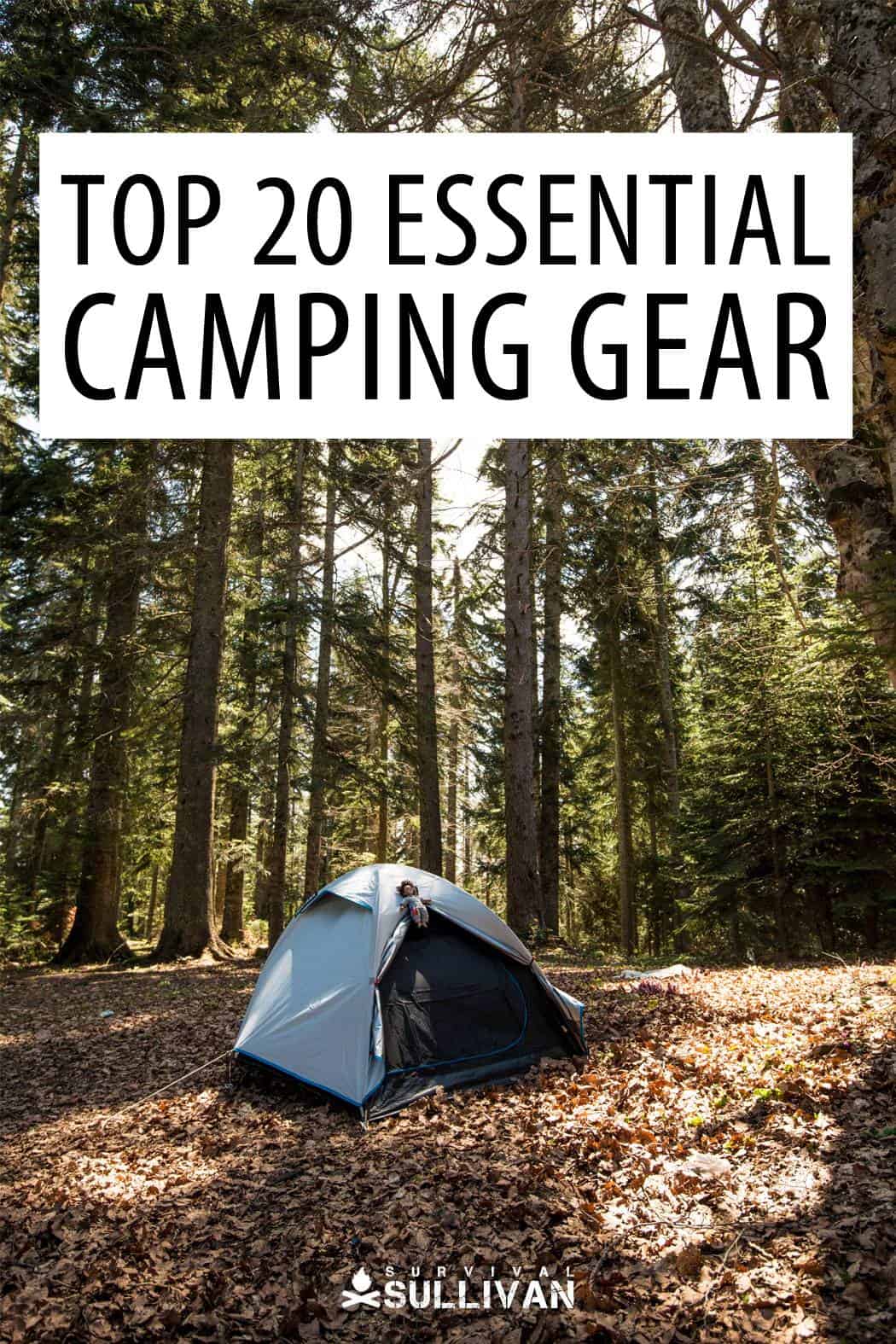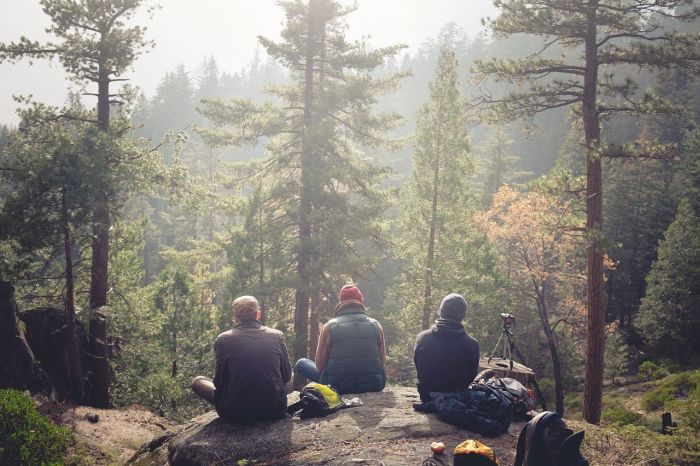
Camping is an activity that most folks will prepare for at some point. Be it a fun recreational activity, a practice run for various skills that must be kept sharp or an actual, live event, sometimes you just need to get away from it, all and chill out in the wilderness for a little while.
But camping is rarely as easy as it appears in the movies and on TV. There is plenty that can go wrong, and screwing up any essential element is bound to result in a miserable time, and might even put you in danger.

It seems like there is no end to the amount of gear that people haul with them when going out even for short camping trips, but you won’t need to drag everything plus the kitchen sink with you if you plan your trip around the essentials.
Like many other endeavors, executing a camping trip properly is mostly about having the right gear, and that means a comparatively light load of basic equipment, chosen correctly and employed properly, will allow you to face pretty much any circumstances you might encounter.
In this article we’ll be sharing with you 20 must-have pieces of camping gear.
It Is All About the Basics
One popular take on camping these days involves hauling a metric ton of gear with you in order to better simulate the modern domestic experience outdoors. Expect intricate outdoor kitchen setups, large RVs, overpriced designer coolers, and more.
Sometimes called “glamping”, a portmanteau of glamour and camping, this exercise in excess might be fun for some, but it has very little to do with the actual experience of proper camping, and does almost nothing to work out your hard skills.
If you or anyone else enjoys such an experience, more power to you, but this overblown, overstuffed, and excessive spin on camping is not going to better prepare you to adapt and live comfortably in an outdoor environment with a typical, man-packed load.
The bottom line is you don’t need all that stuff, not to have a good time and not to survive, either. It is entirely possible to survive and even thrive on a whole lot less, as generations of our ancestors have proven time and time again.
Like mastering any other skill, you’ll go a lot farther a lot faster if you focus on mastering the basics.
After all, there is really no such thing as advanced skills, advanced gear, or advanced application: there is only ever an increasingly refined exercise of basic skills that are inherent to execution of the task at hand.
Our list of essential gear below adheres to this philosophy. If you have the right gear and you know what you are doing with it, you can go in surprisingly light and still enjoy yourself, or at the very least save a ton of energy and frustration when moving about.
Now, on to the list!
20 Must-Have Camping Essentials
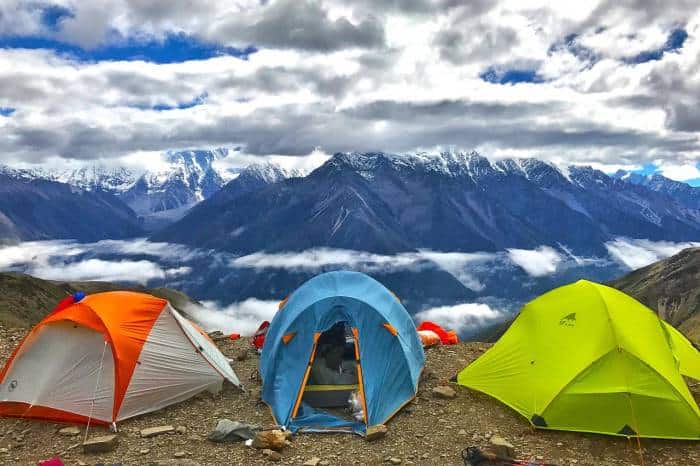
Tent / Bivy
One piece of gear that is singularly iconic to the camping experience is the tent. No matter where you are going, no matter what you are doing, you need a reliable way to get in out of the elements and stay warm while keeping rain, wind and snow off your back.
The tent is the perfect option. Happily, compared to tents of yesteryear, modern hiking and expeditionary tents are simpler, lighter and more efficient than they have ever been, capable of withstanding surprising amounts of abuse while affording you excellent shelter and adding little to your overall load.
Tents are also excellent for getting your backpack and other essential gear out of the weather.
However, any tent that uses a multi-part frame system will require some practice in order to reliably set it up and tear it down correctly, especially when you are already tired and it is getting dark.
There is nothing more demoralizing than fumbling around in the darkness trying to insert Tab A into Slot B when all you want to do is get off your feet and get some shut eye.
For those who do not require the room or protection of a full size tent, a super small one-man version called a bivy can save even more weight and bulk, while affording you adequate shelter.
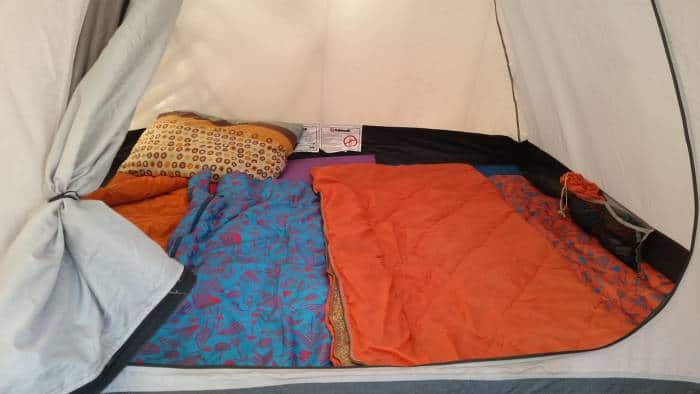
Sleeping Bag
Sleeping bags are a piece of kit that goes hand in hand with camping much like the tent does.
More than anything else, a sleeping bag is going to keep you warm when temperatures start dropping, and there’s hardly anything more comforting than snuggling down into a warm, puffy sleeping bag when the outside air gets chilly.
Depending on where you are going, you might use a sleeping bag in conjunction with a tent or you might opt to sleep under the open sky. That all depends on the forecast and your local climate.
Out of all the things you might carry, the sleeping bag is likely to be the bulkiest, although it does not have to be the heaviest.
High end sleeping bags are remarkably lightweight, and can pack down into a surprisingly small bundle, though you will pay a premium for these advanced materials and designs.
One thing you should never do, however, is forgo taking a sleeping bag with you unless you are traveling through the very warmest climates or biomes.
Ground Pad
A ground pad, or sleeping pad, is a genuinely essential piece of gear if you want to get any meaningful rest out in the field.
For those who have never tried it, sleeping on the ground is certainly an experience, and it is unlikely to be a positive one unless you come prepared! The ground makes for unpleasant rest, and if you thought sleeping on the floor in your home was bad you haven’t seen anything yet.
The reason why is that the ground will positively suck heat out of your body, and it also makes for a poor surface to rest your body on, being uneven, bumpy, and packed with pebbles, rocks, roots and other things that are bound to leave a sore spot when you wake.
All of these unhappy outcomes can be avoided by the use of a ground pad that you can rest your body or your sleeping bag upon. Solid closed cell foam and inflatable models are both worthwhile.

Tarp
The humble tarp is an excellent and minimalist piece of camping gear that you should never go into the field without.
With very little effort, you can set your tarp up as a dedicated shelter or an extension to an existing shelter like a tent or baby, a ground cover, a windbreak, a reflector for your campfire or a privacy screen. That is a ton of capability out of something that weighs only a few ounces.
Any tarp you choose should be made out of lightweight, water repellent synthetic material and feature heavy duty grommets that can withstand some heaving, hauling and tugging.
You should avoid any tarp that is made out of heavyweight canvas or other similar material because it will weigh you down, however strong it might be.

Paracord / Accessory Cord
You should never head off camping without a generous roll or hank of sturdy cordage, whatever kind it might be.
Cordage is used for all sorts of things in the field, from improvised constructions and securing gear to fashioning ad-hoc tools. You’ll definitely use it for implementing your tarp in the previous entry and it also comes in handy for helping to secure your tent, bivy and other gear.
The two favorite types of cordage that most campers use is either going to be the now ubiquitous and greatly beloved paracord, or the slightly less common accessory cord.
Comparing the two, paracord is immensely strong, but is somewhat bulkier and less flexible than accessory cord.
Accessory cord is more than good enough for most purposes in the field and is both smaller and lighter when compressed or rolled up, but some preppers and campers still feel best with the extra assurance provided by paracord.
Emergency Blanket
Out of all the things that can hurt you in nature, and all the bad outcomes that might be for you, one of the most common and the deadliest is simple exposure.
Exposure to the elements, particularly low temperatures and windy conditions while wet, can result in a plummeting core body temperature that will quickly incapacitate and then kill you when conditions are just right.
Exposure is such an endemic threat that most of the gear we carry into the field with us is intended to prevent exactly that.
One piece of gear that is so light, so cheap and so easy to use that it borders on criminal to go without it; the emergency blanket, sometimes called a space blanket.
These crinkly, extra large pieces of foil reflect infrared heat energy emitted by our bodies back on to us, helping to keep us drastically warmer in any conditions.
They can easily be used as is when wrapped tightly around your shoulders, or can be set up as a supplement to your tent or other shelter, or as a reflector to maximize the warmth provided by your campfire.
Outerwear
I could not begin to tell you how many day hike “close calls” and overnighter “holy smokes, there I was” stories I have listened to that, all could have been avoided if only the tellers of said stories had the good sense to toss suitable outerwear into their backpacks before they set out.
As I just finished mentioning above, exposure is one of the single biggest and most certain killers in outdoor survival situations, and you can give yourself a huge edge against it by always taking along suitable outerwear, no matter what the forecast says and what the weather feels like.
Your outerwear should always be specific to your season and local climate, and should be packed with typical weather conditions in mind.
Even in hot, arid climates you should take suitable outerwear for protection against sun exposure and also low nighttime temperatures and precipitation. Going without correct outerwear will leave you numbed and shivering if the weather turns against you.
Water Bottle / Canteen
Water is a precious survival resource, and you should never head into the field without at least one large container full of drinking water.
Almost as important as the water itself is something to carry it in that is easy to drink from. No surprise here, you need a modern water bottle or canteen for the purpose.
There are seemingly a billion options on the market for each, and we aren’t going to delve into which one is best or worst and why.
What you should be concerned with is choosing one that is durable, leak proof and features a sturdy, tethered cap so you won’t lose it.
Nothing is worse than having a leaky water bottle, as it will deprive you of cool, clear water to drink and also ruin any gear that is in your pack when it decides to let loose its contents!

Water Filter
The biggest problem with water as a survival resource aside from our total dependency on it to survive is its sheer weight. Water is extremely dense, and that makes it very heavy by volume.
Trying to carry enough water with you camping to drink over any length of time is going to quickly wear you out as you’ll be carrying 20, 30 or more pounds of water in addition to all your other gear.
A better solution for keeping loads light and you moving and hydrated is a water filter that will allow you to draw from any found water sources you come across.
Water filtration technology has come a long, long way just in the past decade and modern, field portable water filters are capable of rendering even the most questionable, murky water into crystal clear and completely drinkable water and just a few seconds.
A compact model weighs very little and is capable of processing hundreds of gallons of water before it needs servicing. Berkey and LifeStraw both make excellent models for the purpose.
Bug Spray
If there is one annoyance that will ruin a camping trip faster than anything and drive you to the brink of madness it is blood sucking, biting insects.
Mosquitoes, chiggers, no-seeums, ticks, fleas and other creepy, crawly menaces will be found in tremendous quantity in the wild places of the world, far more than you are used to encountering around your home in suburbia or in the city.
Beyond mere annoyance, many of these creatures pose a significant danger as they are capable of spreading diseases that will make you terribly ill or even result in lifelong complications.
Lyme disease is one such ailment that is increasingly common among various ticks, for instance.
Unless you are going to walk around in a completely sealed suit, you’ll have no choice but to rely on bug spray. Make sure you get a good one and apply it regularly according to the instructions on the can or package.
Flashlight / Headlamp
A personal lighting source is absolutely essential for any camping trip conducted for any purpose. It is easy to forget just how dark the world gets after nightfall when you are away from human habitation and roads.
Especially when under the canopy of the forest, you can be plunged into frankly shocking darkness that makes it entirely easy to get turned around, stumble, or fall, among innumerable other hazards waiting for you.
The simplest and safest method for banishing the darkness while camping is to rely on a trusty flashlight or headlamp, and preferably both.
The utility of flashlights needs no explanation, but headlamps are also an excellent option, allowing for completely hands-free task lighting ideal for chores around camp, or walking on the trail while managing a load.
Make sure you bring plenty of spare batteries, or a power support option to keep them fueled and lit.
Cutlery Set
Whether you are eating food you brought with you, or wild-sourced fare from the area around you, you’ll need something to eat with while at camp – and that means you’ll need a cutlery set consisting of plate, utensils, cup and assorted small pots suitable for boiling water or heating food.
Everyone has their preference in this category, with some people depending upon collapsible or multipurpose options to keep surplus weight and bulk to an absolute minimum, while other campers like to splurge on a complete (if spartan) set that more closely replicates meal time as it would be at home.
Whatever you get, make sure it is heat resistant and corrosion proof.

Fire Starter
Fire is one of mankind’s oldest and most capricious tools, and still one of the most important when you are faced with long, cold and dark nights at camp.
A campfire provides light, warmth, the capability to cook and boil water, and not for nothing that magic that makes time spent at camp with your mates or your family members so magic and memorable. Gathering around the fire is practically baked into our DNA!
It stands to reason you will want a reliable method of starting a fire at camp. No camper should leave for the great outdoors without at least two methods of starting a fire on demand.
Lighters or waterproof matches are one good option, but the other should be a more traditional and more durable one such as a pharaoh rod or other striker system. Either of the latter two will produce a blast of intensely hot sparks capable of catching tinder even in the worst conditions.

First-Aid Kit
When far from civilization you won’t be able to depend on heading to the emergency room or doctor’s office when you get hurt or sick, and relying on emergency medical services or search and rescue is a dicey proposition at best unless you are at a well-marked and well-traveled campground.
You’ll need to be ready to provide for your own healing and relief, and that means you need a first-aid kit.
A good camper first aid kit should consist of the basic boo-boo care items you’d expect, things like:
- antiseptic wipes
- band-aids
- antibiotic ointment
- tweezers
- blister care
- bug bite cream,
- and a variety of over the counter medications.
You should also include stuff for dealing with more serious trauma like sprains, strains, broken bones, major lacerations and penetrating injuries.
You’ll need to have some legitimate skills under your belt to make use of that ladder category so make sure you get training to go along with the kit!
Baby Wipes
One thing that you will likely miss on extended camping forays is access to your usual bathroom routine for bathing and personal grooming.
Though some campers go to incredible links to maintain this level of hygiene while out in the field, it is rarely practical, and instead you will have to settle for a greatly abbreviated hygiene standard at best.
However, if there is one item that will drastically help to cut down on your personal funk and keep you smelling fresher, if not properly fresh, it is baby wipes.
A long time favorite of soldiers and other outdoor professionals who have to give up regular baths or showers, baby wipes will allow you to hit the most troublesome parts of your body by removing grime, grease and grit without the need for any water or soap.
Get a big pack, and keep them handy!

Duct Tape
Duct tape is another one of those tools that all campers love, and you’ll come up with countless uses for it while out in the field. From quickly mending a tear in your tent to holding a busted boot heel on so you can make it back to your vehicle, duct tape will never let you down.
Duct tape is so versatile, so useful, and such a lifesaver in so many different circumstances, me and many other campers consider it legitimate life support equipment.
I go all out and include a full roll of duct tape in my camping pack at all times, but if you want to get by with a little less you can remove a length of it from the roll before winding it around a pencil or empty pen tube to make it more compact.
Ziploc Bags
Gallon, zipper-locking freezer bags belong in every camping kit, and are another one of those items that are sublimely useful.
You can use these things for trash collection, compartmenting small bits of equipment and gear, holding food (naturally) or waterproofing sensitive electronics and other delicate items to keep them safe from weather or water crossings.
Ziploc bags also play an important survival role as they can be repurposed as chest seals for dealing with penetrating injuries to the thorax or used for reliably collecting and transporting water in addition to what you can hold in your water bottle or canteen.
One tip, make sure you get Ziploc brand bags that use the traditional “clicky” zipper strips, and not that weird slider thing. The slider ones don’t hold up as well, and they leak.

Multi-Tool
Every camper needs a few, smartly chosen tools so they can be ready to improvise construction or make repairs while in the field.
Hauling several dedicated tools with you is going to weigh you down quickly, but most forays can be adequately managed with nothing more than a high-quality multi-tool like the legendary Leatherman or the popular Gerber.
A good multi-tool will include a variety of bits, blades, saws and other gadgetry along with a sturdy set of pliers. These tools will easily facilitate repairs of your own gear and perform other chores around camp.
You’ll never be sorry you have brought one of these things with you, and it deserves a place of pride in your pocket or on your belt while out camping.
Boots / Trail Shoes
One of the biggest mistakes I see new campers make is wearing inadequate footwear for life in the field or around camp. Tennis shoes and traditional sneakers don’t cut it, and you’d be a fool to wear any fashion-forward footwear.
Especially when you are out for a long hike or multi-day adventures, you will want to commit to wearing a sturdy pair of boots or rugged trail shoes that are lighter, while still affording you plenty of grip and comfort.
Exposing your feet to the unknown and often unforgiving ground when they have not been toughened up by months or years of going barefoot is a recipe for disaster, and an injury to your foot or ankle can quickly hobble you when you can least afford it. Consider a rugged pair of boots or trail shoes much needed armor for your feet.
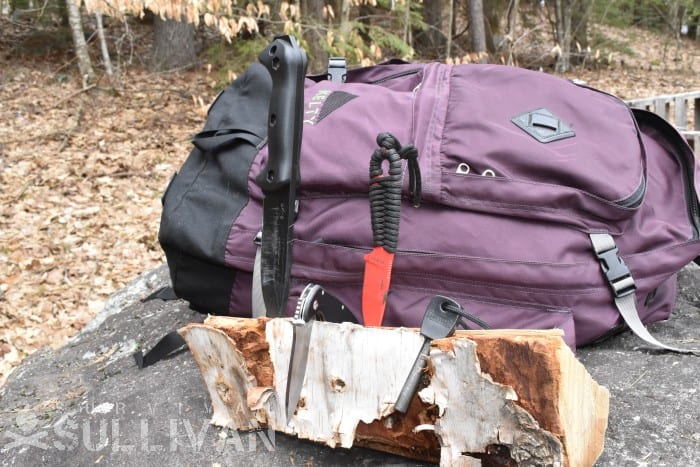
Backpack
No camping trip is complete without a backpack to haul all of your gear on the adventures you are bound to have.
You only have so much room in your pockets and on your belt, and neither are adequate for carrying all of the necessary equipment you’ll need on your trip if you want to stay prepared and safe.
Backpacks are a topic unto themselves, and there is hardly one that is more discussed and often argued about than this one.
Once again, every camper has their preference and it is typically dictated by what kind of camping they engage in and how long they stay out.
Short trips or trips closer to home are best served by small, lightweight packs while extended forays will necessitate larger packs with better capacity for all the things you’ll need.
Conclusion
Being an efficient and well prepared camper does not necessarily entail bringing with you a baggage train that would put royalty to shame.
It is entirely possible to have an enjoyable, efficient and meaningful time out camping using the bare minimum of gear if you know what you absolutely have to have and how best to use it.
By sticking to just to the essentials you’ll have a lighter load to carry and less to deal with, freeing up more of your time for more important tasks than hauling luggage.
